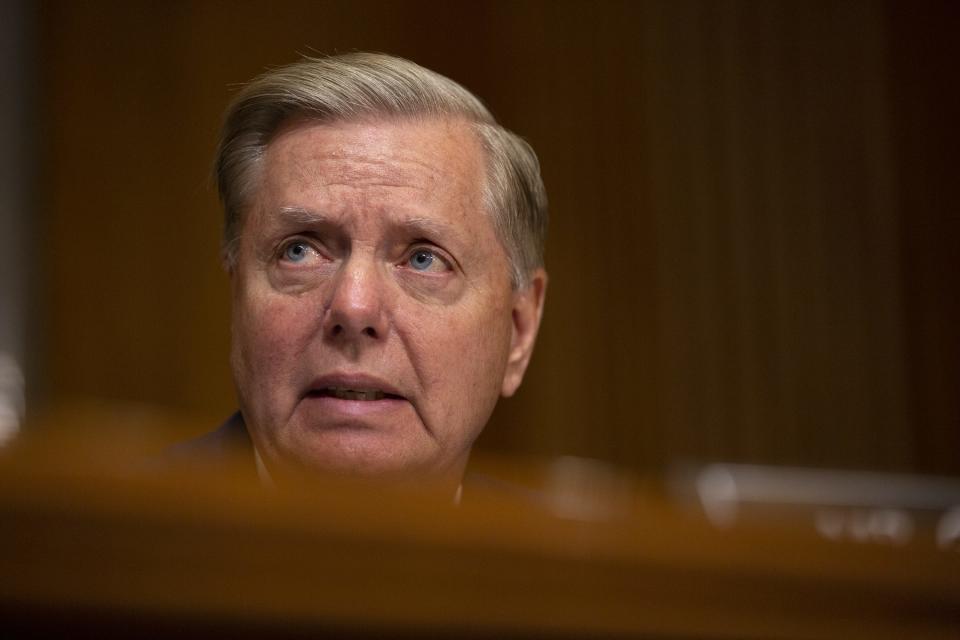In rare rebuke, Senate votes to block Trump administration's weapons deal with Saudi Arabia
WASHINGTON – The Senate voted 53-45 Thursday to block the Trump administration from selling U.S.-made weapons to Saudi Arabia and its allies, a rare rebuke of the White House by the Republican-led chamber.
The move pushed by a bipartisan group of senators highlights a rift between Congress and the White House over the Trump administration's pro-Saudi policies, even as the kingdom has committed a series of high-profile human rights violations.
The Senate voted to pass 22 "resolutions of disapproval" to try to block a pending $8.1 billion arms deal to Saudi Arabia, Jordan and the United Arab Emirates. White House officials said they will advise the president to veto the bill and allow the weapons sale to proceed.
Opponents of the deal cited not only anger at the Saudi government for its alleged role in the murder of journalist Jamal Khashoggi and its involvement in the war in Yemen, but also what they see as Trump's strong-arm efforts to sell weapons without seeking congressional say-so.
Sen. Bob Menendez, D-N.J., the chief sponsor of the legislation, said the vote was not "about any one president or any one arms sales" but about being an "effective check" on the executive branch.
"We must both assert our role in upholding the rule of law at home and use our position to ensure that when our government seeks to swell weapons, those sales advance our national security interests and our values," he said.
He was joined by almost every Democrat and six Republicans – Lindsey Graham of South Carolina, Rand Paul of Kentucky, Jerry Moran of Kansas, Lisa Murkowski of Alaska, Todd Young of Indiana and Mike Lee of Utah – in voting to block the deal.
Despite the bipartisan rebuke of the administration's policy, opponents didn't muster the 67 votes necessary to override the presidential veto the White House threatened Thursday.
"Apart from negatively affecting our bilateral relationship with the Kingdom of Saudi Arabia, the joint resolution would hamper our ability to sustain and shape critical security cooperation activities and would significantly hinder the interoperability between our nations," the White House statement read. "Additionally, the joint resolution would impact our partner’s ability to deter and defend against Iranian military aggression."
Secretary of State Mike Pompeo announced the $8.1 billion weapons deal last month – and said the administration would sidestep the normal congressional approval process by declaring a national security emergency. Pompeo said threats from Iran, a foe of the United States and Saudi Arabia, justified the decision to bypass congressional review.
Trump's furlough threat: President's team threatens to lay off employees if Congress doesn't eliminate agency
The move sparked immediate blowback on Capitol Hill. Lawmakers in both parties questioned the legitimacy of Pompeo's "emergency" declaration, and they argued that Saudi Arabia has become an unreliable ally, undeserving of U.S. weapons.
"Now is not the time to do business as usual with Saudi Arabia," Graham, usually a staunch Trump ally, said this month.
Graham and others are particularly incensed about the alleged role of Saudi Crown Prince Mohammad bin Salman in the slaying of Jamal Khashoggi, a Washington Post columnist killed last fall at the Saudi Consulate.

Thursday's vote comes in the wake of a United Nations report on the Khashoggi case. The report concluded there is "credible evidence" that high-level officials in Saudi Arabia – including the crown prince – were involved in Khashoggi's death.
Biden: Booker should apologize after criticism of my comments on segregationists
The Trump administration sanctioned 17 Saudis it deemed to have played a role in Khashoggi's death. Trump condemned Khashoggi's slaying but questioned the CIA's assessment that the crown prince directed the killing and argued that the slaying should not impact the U.S.-Saudi relationship.
Senate Majority Leader Mitch McConnell, R-Ky., who voted against the measure, said the "vast majority" of senators are concerned about the actions of Saudi Arabia.
"But rejecting long-planned arms sales strikes me as an overly blunt tool with several unintended consequences," he said on the Senate floor Thursday before the vote. "The dynamics at play are not black and white. We can best shape these dynamics by working closely with our partners to encourage them in the right direction rather than turning our back."
Lawmakers in both parties are concerned about the Saudi-led bombing campaign in Yemen, which has killed thousands of civilians and created a humanitarian disaster.
"Selling more bombs to the Saudis simply means that the famine and cholera outbreak in Yemen will get worse, Iran will get stronger, and Al Qaeda and ISIS will continue to flourish amidst the chaos of the civil war," Sen. Chris Murphy, D-Conn., said in a statement supporting the legislative rebuke.
Thursday's Senate vote comes on the same day that a court in the United Kingdom declared the U.K. government's sale of British-made arms to Saudi Arabia unlawful. Human rights advocates hailed the ruling as a major victory.
“The Saudi Arabian regime is one of the most brutal and repressive in the world, yet for decades, it has been the largest buyer of U.K.-made arms," said Andrew Smith of the Campaign Against the Arms Trade, which brought the legal challenge. “The bombing has created the worst humanitarian crisis in the world. U.K. arms companies have profited every step of the way. The arms sales must stop immediately.”
Mike Pence: Is the VP channeling Queen Esther? Or the apostle John? A new book examines this and more
This article originally appeared on USA TODAY: In rare rebuke, Senate votes to block Trump administration's weapons deal with Saudi Arabia

